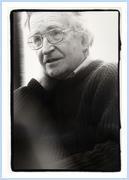 Faccio una cosa che non si dovrebbe fare: vi consiglio un libro che io non ho ancora letto (perché ne ho scoperto l'esistenza solo un paio di giorni fa), ma se scorrete la breve recensione sotto capirete perché.
Faccio una cosa che non si dovrebbe fare: vi consiglio un libro che io non ho ancora letto (perché ne ho scoperto l'esistenza solo un paio di giorni fa), ma se scorrete la breve recensione sotto capirete perché.Chomsky Noam; Shiva Vandana; Stiglitz Joseph E.
La debolezza del più forte. Globalizzazione e diritti umani
€ 8,40 - 298 pagine
Editore Mondadori - 2004
In sintesi - Il commercio su scala planetaria, la rivoluzione del web, i satelliti, il nuovo turismo di massa fanno circolare sempre più velocemente merci, persone, idee e informazioni. In questo scenario in continuo e profondo mutamento che fine fanno i diritti umani? Se lo sono chiesto alcuni importanti intellettuali riuniti presso l'Università di Oxford per un ciclo di conferenze e dibattiti patrocinato da Amnesty lnternational. Filosofi, letterati, economisti, giuristi, attivisti politici e ambientalisti hanno discusso del rapporto tra globalizzazione e diritti umani, ognuno con un approccio differente. Il testo dei loro interventi è stato raccolto in questo volume.
Mi dà conforto vedere che i tre più accesi detrattori della globalizzazione (o meglio dei suoi aspetti deteriori) a livello mondiale sentono il bisogno di parlare anche di diritti umani, partecipano alle conferenze di Amnesty International e che da tutto questo esce anche un bel saggio nelle edizioni Mondadori (tié!).
No global o no, leggere questo libro potrà solo farci bene.
Non passa giorno in cui la cronaca non dimostri che la cosiddetta "globalizzazione", oltre a portare tanti progressi e tante cose buone e giuste, sia fonte anche di clamorose violazioni dei diritti umani. Per questo autorevoli figure, del calibro di Noam Chomsky, Vandana Shiva e Joseph Stiglitz (vedi anche il post "Abbiamo scherzato"), se ne occupano senza stancarsi: leggo sul sito di Amnesty Irlanda che Noam Chomsky ha tenuto proprio ieri sera (!) ospite del Trinity College a Dublino la sua Annual Lecture, di cui presto sarà disponibile sul sito il testo integrale, sul tema della guerra al terrore.
Cosa avrei dato per esserci, che invidia... ma presto riusciremo anche noi a invitare Noam Chomsky nella sede di Via Irma Bandiera, magari nella stessa sera in cui premieremo gli U2 a Villa Serena... il delirio di onnipotenza del Gruppo di Amnesty Bologna non ha più confini ;o)))
- - -
da www.amnesty.ie
Noam Chomsky To Deliver Annual Amnesty Lecture
 Noam Chomsky
Noam ChomskyDublin - Wednesday 18th January 2006
Described by The New Yorker as 'one of the greatest minds of the 20th century', Noam Chomsky will give the 2006 Amnesty Lecture in the Shelbourne Hall, RDS D.4 at 7pm on January 18th, the theme of which will be 'The War on Terror'.
Press Release: Amnesty International Annual Lecture
18th January 2006
Professor Noam Chomsky - ''War on Terror''Amnesty International Annual Lecture
Shelbourne Hall RDS Dublin, 18th January 2006
Hosted by Trinity College Dublin
Professor Noam Chomsky Speaking at the Annual Amnesty International Lecture hosted by Trinity College addressed the issue of human rights abuses in the context of the war on terror. Since the end of World War II, the international community has worked to build up a system of human rights protection based on the Universal Declaration of Human Rights. That system seeks to guarantee the rule of law, freedom of expression and freedom from torture.''In the context of the 'war on terror' the international ban on torture and other cruel, inhuman and degrading treatment has been flouted and challenged by governments around the world,'' said Executive Director of Amnesty International Irish Section, Seán Love, in Dublin today.''The tragedy facing us is that one of the first victims of the 'war on terror' is that very system of human rights protection - in the name of security,'' added Love.Governments led by the United States have sought to justify and redefine the use of torture, and undermine the Geneva Conventions and the effectiveness of the International Criminal Court. ''If we tolerate the use of torture it will be almost impossible for us to hold the line on other human rights standards. We must resist this attempt to fight terror using terror and challenge the international community and the Irish government to uphold the protection of human rights as a core value'', said LoveSpeaking at the Amnesty International annual lecture at the RDS in Dublin, Professor Noam Chomsky said, ''Facts matter, even if we do not like them. Elementary moral principles and agreed standards of international law matter, even if they have consequences that we would prefer not to face.''The US government has been at the forefront in arguing that the internationally accepted legal framework no longer applies, and that people rounded up in the ''war on terror'' can be denied the protection of the Geneva Conventions. Some governments ( including China, Egypt, Malaysia, Saudi Arabia, Uzbekistan and Yemen have used the rhetoric of the ''war on terror'' to justify or intensify old patterns of repression. Other states ( including Australia, Jordan and the UK as well as countries in the Gulf region) have intensified the use of draconian laws and abusive practices.''There are ways to deal constructively with the threat of terror, though not those preferred by 'bin Laden’s indispensable ally', or those who try to avoid the real world by striking heroic poses about Islamo-fascism, or who simply claim that no proposals are made when there are quite straightforward proposals that they do not like. The constructive ways have to begin with an honest look in the mirror, never an easy task, always a necessary one,'' said Professor Chomsky.
- - -

Nessun commento:
Posta un commento